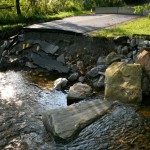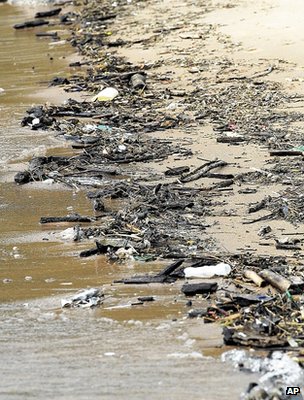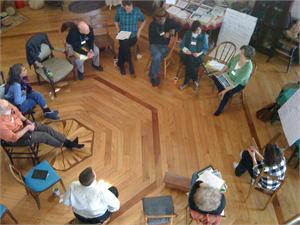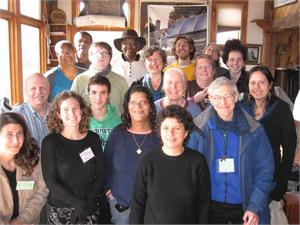- VICTORY! BEAT Gets State to Update Its Stormwater Calculations
- Alexandra Dawson Memorial Set for March 4th in Amherst
- How You Can Help Move the Keystone XL/Climate Fight into the Election Year
- ‘We the People’ Can Overturn Citizens United
- Massachusetts Transportation Survey
- Citizens United anniversary: Everything it was cracked up to be and more
- Candidates say “Enough already with the Super PACs”
- Accumulating ‘Microplastic’ Threat to Shores
- Audubon exhibit flies into the Berkshire Museum
- If It’s Broke, Fix it! Brooklyn’s Fixers Collective
- UMass Amherst Releases Results of First Comprehensive Assessment of Ecological Integrity
- Climate Change and Water Progress Report
- New Tool for Water Pollution Data
- Saving Biodiversity: Protecting Species in Berkshire County and Beyond
- Join Sierra Club members for free pizza and discussion on how to move the Pioneer Valley away from dirty energy sources and towards a clean energy future
- MACC 41st Annual Environmental Conference
- MEES Conference
- Co-op Power Leadership Retreat: Strengthening Our Communities
- 2012 Massachusetts Arbor Day Poster contest
- Snowshoe Hare February Vacation Camp
- March 1 Deadline for Harvard Business School Scholarship
- Recycling Liaison Needed
VICTORY! BEAT Gets State to Update Its Stormwater Calculations
– January 31, 2012

Photos: Carrie Banks, MA Division of Ecological Restoration Bonny Rigg Road "over" Walker Brook in Becket
Our climate is changing. There really isn’t any debate in the scientific community anymore. The scientific community has moved on to solving the problem of what do we do about climate change. One thing we can do is change our preparedness for more intense storms and heavier rainfall. Most of the country has been doing this. Forty-eight states have updated their formulas used to calculate the amount of water that can be expected to flow in streams and rivers during typical and atypical storms. Rhode Island has been working on updating their calculations so that they can become the 49th state. That leaves Massachusetts as the only state not updating its stormwater calculations.
These calculations are used to predict the amount of floodwater a community can expect during an x-year storm (e.g., 50-year storm, 100-year storm, 500-year storm). This can help determine such things as how big a culvert under a road needs to be in order to keep that road from washing out during a storm. Well, Massachusetts has joined the fold, and has started taking steps to become the 50th state to update its stormwater calculations, and if we do say so ourselves, BEAT was the driving force in getting the state to act. Read the full story!
Alexandra Dawson passed away on December 30, 2011. She died at home peacefully after battling emphysema. We all miss her wit, silly words and expressions, insightful analysis, and strong will. We are comforted by the warmth and beauty of the quilts she handmade for all of us, and by the deep sympathies expressed by colleagues, friends and family, near and far.
We invite you to join us at a memorial celebrating Alexandra’s life on Sunday, March 4, 2012, 2-4 pm in the Parish Hall of Grace Church, 14 Boltwood Ave, Amherst, MA.
We look forward to seeing you soon and sharing stories and memories of Sandra’s life, work, and friendships. Light refreshments will be served, directions below.* Please let us know if you can attend: alexandramemorial@gmail.com.
We include one of the many tributes and obituaries (pdf), and are greatly amused by how many of the pieces about Sandra described her as “fierce,” “feisty,” “a force,” and appreciated her “salty language.” Apparently, everyone loved the same person we do – she was and is unique.
Some have asked about donations. In honor of Alexandra’s lifelong work and legacy for protecting the Earth, memorial gifts may be made in Alexandra’s name to The Kestrel Land Trust,
P.O. Box 1016, Amherst, MA 01004, or at www.kestreltrust.org.
How You Can Help Move the Keystone XL/Climate Fight into the Election Year
On Wednesday, February 1 at 3 pm eastern/12 noon pacific time, the Climate Reality Check coalition will hold the latest in our series of national conference calls to help strengthen community organizing on climate, entitled: Moving the Keystone XL/Climate Fight Into the Election Year.
We are pleased to have Bill McKibben lead the discussion.
On the heels of President Obama’s decision to deny Trans Canada’s application for a permit to build the Keystone XL pipeline, we’ll discuss the key lessons from the successful campaign and what they mean for our work on climate during this election year.
We’ll discuss:
- The significance of nonviolent civil disobedience;
- The breadth of the alliance of organizations which worked together for this victory;
- The key messages used by the campaign;
- How Big Oil lost this round despite their power and money;
- What’s next for the pipeline fight; and
- If the campaign’s intense focus on President Obama has implications for the climate movement in 2012.
Please RSVP here:
https://spreadsheets2.google.com/spreadsheet/viewform?formkey=dFNyS3N0aEMzSnktR0c0UEkwY0NfQ0E6MQ
The call-in number is 209-647-1600 Code 615986.
Please feel free to spread the word. We look forward to speaking with you on the 1st.
The Climate Reality Check Coalition
If you have any questions please contact Rose Braz, Center for Biological Diversity, rbraz@biologicaldiveristy.org
Here’s more info on our presenter:
Bill McKibben is the author of a dozen books about the environment, beginning with The End of Nature in 1989, which is regarded as the first book for a general audience on climate change. He is a founder of the grassroots climate campaign 350.org, which has coordinated 15,000 rallies in 189 countries since 2009 and helped spearhead the campaign against the Keystone XL pipeline. Time Magazine called him ‘the planet’s best green journalist’ and the Boston Globe said in 2010 that he was ‘probably the country’s most important environmentalist.’ Schumann Distinguished Scholar at Middlebury College, he holds honorary degrees from a dozen colleges, including the Universities of Massachusetts and Maine, the State University of New York, and Whittier and Colgate Colleges. In 2011 he was elected a fellow of the American Academy of Arts and Sciences.
Climate Reality Check Coalition has a new Facebook group!
It’s a space to comment or ask questions during our monthly climate movement building calls, listen to recordings of past calls, find resource material from our presenters, share and receive articles related to climate or spread the word about your events and actions, click here and join the group.
‘We the People’ Can Overturn Citizens United
The Boston Globe
EDITORIAL by JIM MCGOVERN AND JEFF CLEMENTS
January 21, 2012
THE FIRST three words of the preamble of our Constitution are “We the People.’’
Two years ago today the US Supreme Court in Citizens United v. Federal Election Commission upended that promising vision. Corporations — which do not have mouths, minds, or consciences — won a “free speech’’ right to spend unlimited money to influence elections.
The court cast aside a century of law intended to prevent the biggest, richest corporations from controlling our elections and government. We now see a flood of uncontrolled and undisclosed special-interest money flowing into our electoral system, drowning out the voices of average Americans and deepening cynicism and hopelessness about our politics.
While shocking, Citizens United was not a fluke. Unelected courts have increasingly allowed the radical "corporate speaker" theory that lies behind Citizen United to trump the judgment of the people and their elected representatives, and to damage the public interest far beyond elections.
We see the consequences around us, from jobs and wages to health care and the environment.
A federal judge in Washington recently used corporate speech rights to block the Food and Drug Administration from requiring tobacco companies to place graphic warning labels on cigarette packages.
A federal court sided with Monsanto and other corporations in their efforts against state laws requiring labeling of milk, cheese, ice cream, and other dairy products that come from cows injected with a genetically modified bovine drug that is banned in most democracies in the world.
Utility corporations have used courts to strike down conservation and other energy laws. Wall Street corporations demand the invalidation of shareholder democracy laws. Corporate-owned universities file litigation because they claim graduation and job-placement standards violate corporate rights.
Corporations are not people. They are artificial entities that we the people create under state laws. They do not breathe. They do not have children. They do not go to war. Yet they now have far more say than we the people.
We cannot afford to let Citizens United go unchallenged. We need the People’s Rights Amendment to renew our republican democracy and the integrity of our Bill of Rights.
There are only two ways a Supreme Court ruling can be overturned. The court can do so in a new case, or the people can do so by ratifying a Constitutional amendment, as we have done at least six times before. Given the corporate-friendly approach of the current Roberts court, we can’t wait for the Supreme Court to correct Citizens United.
The People’s Rights Amendment is the best solution. It answers basic question raised by Citizens United: Are we a government of free and equal people or a government of the most powerful, most wealthy corporations?
The People’s Rights Amendment makes clear that the words "people" and "person" in our Constitution mean human beings, not economic entities with special privileges created by state law. This clarifies the authority of Congress and the states to regulate "corporations, limited liability companies or other corporate entities established by the laws of any state, the United States, or any foreign state" as the people see fit. The amendment is crafted to protect the people’s rights of freedom of speech, freedom of the press, free exercise of religion, freedom of association, and all other rights.
We need a serious, thoughtful debate in this country on the role of corporations in our lives. The People’s Rights Amendment will spur that debate and, once ratified, will ensure, in Lincoln’s words, that "government of, for, and by the people shall not perish from the Earth."
Massachusetts Transportation Survey
![]()

In 2009, MassDOT’s youMove Massachusetts project team met with people across the Commonwealth to learn about the transportation challenges individuals faced on a daily basis. From this effort, we developed a list of ten core themes: statements of fundamental importance that articulate the concerns, needs, and aspirations of Massachusetts residents for their transportation network.
I am writing to you because, as part of weMove Massachusetts (the next step in this initiative), we’d like to hear in more detail about the transportation experiences and needs of a wide range of stakeholders. We are collecting these transportation experiences and ideas to incorporate them in our goals and implementation of transportation reform. This information is being used to develop a system of priorities for transportation system investments.
I hope you will share this email and information about this effort with your colleagues and stakeholders you represent. We hope a large number of participants will visit the youMove Massachusetts website and fill out our online questionnaire (available in English, Spanish, Haitian Creole and Portuguese). Individuals may also use our interactive map (available in Spanish and English) to pinpoint a specific issue or need.
If you need a print copy of the questionnaire, please contact Rachel Hammerman, Regina Villa Associates, rhammerman@reginavilla.com, and she will mail it to you. Please specify the language you need.
Feel free to email me if you have any questions about this project.
Thank you,
Trey Wadsworth
Project Manager
Massachusetts Department of Transportation – MassDOT
Office of Transportation Planning
trey.wadsworth@state.ma.us
www.massdot.state.ma.us/wemove
For transportation news and updates visit MassDOT at our website: www.mass.gov/massdot, blog: www.mass.gov/blog/transportation, or follow MassDOT on twitter at www.twitter.com/massdot.
Citizens United anniversary: Everything it was cracked up to be and more
from “Money and Democracy Update” is Public Citizen’s weekly e-newsletter
We’ve been telling you for a while about the momentum that built toward protest events slated for Saturday, Jan. 21, the second anniversary of the U.S. Supreme Court’s ruling in Citizens United v. Federal Election Commission. The anniversary was everything we thought it would be and then some. Citizens and elected officials took to the streets in cities throughout the country to call for a constitutional amendment to overturn the decision. Check out these pieces in Mother Jones, Truthout.org and Firedoglake. If you haven’t joined the movement, it’s not too late. Visit www.DemocracyIsForPeople.org.
Candidates say “Enough already with the Super PACs”
from “Money and Democracy Update” is Public Citizen’s weekly e-newsletter
It might not work but it’s worth a shot. U.S. Sen. Scott Brown (R-Mass.) and his opponent Harvard Professor Elizabeth Warren have signed a “People’s Pledge agreement” designed to keep Super PACs and the negative ads they pay for out of the race. Under the agreement, whichever candidate is aided by an ad paid for by a third party must contribute an amount worth half the ad to his or her opponent’s charity of choice.
Accumulating ‘Microplastic’ Threat to Shores
By Mark KinverEnvironment reporter, BBC News

Concentrations of microplastic were greatest near coastal urban areas, the study showed
Microscopic plastic debris from washing clothes is accumulating in the marine environment and could be entering the food chain, a study has warned.
Researchers traced the "microplastic" back to synthetic clothes, which released up to 1,900 tiny fibres per garment every time they were washed.
Earlier research showed plastic smaller than 1mm were being eaten by animals and getting into the food chain.
The findings appeared in the journal Environmental Science and Technology.
"Research we had done before… showed that when we looked at all the bits of plastic in the environment, about 80% was made up from smaller bits of plastic," said co-author Mark Browne, an ecologist now based at the University of California, Santa Barbara.
"This really led us to the idea of what sorts of plastic are there and where did they come from."
Dr Browne, a member of the US-based research network National Center for Ecological Analysis and Synthesis, said the tiny plastic was a concern because evidence showed that it was making its way into the food chain.
"Once the plastics had been eaten, it transferred from [the animals’] stomachs to their circulation system and actually accumulated in their cells," he told BBC News.
In order to identify how widespread the presence of microplastic was on shorelines, the team took samples from 18 beaches around the globe, including the UK, India and Singapore.
"We found that there was no sample from around the world that did not contain pieces of microplastic."
The smallest fibres could end up causing huge problems worldwide
Dr Browne added: "Most of the plastic seemed to be fibrous.
"When we looked at the different types of polymers we were finding, we were finding that polyester, acrylic and polyamides (nylon) were the major ones that we were finding."
The data also showed that the concentration of microplastic was greatest in areas near large urban centres.
In order to test the idea that sewerage discharges were the source of the plastic discharges, the team worked with a local authority in New South Wales, Australia.
"We found exactly the same proportion of plastics," Dr Browne revealed, which led the team to conclude that their suspicions had been correct.
Audubon exhibit flies into the Berkshire Museum
By NICHOLE DUPONT, Weekly Advocate
Posted: 01/25/2012 11:09:26 AM EST
|
"Birds of America" is not your average ornithologist’s field guide. In fact, the multivolume work, which measures 26 inches by 37 inches per plate (page), is arguably more a work of art than science. Just ask London book dealer Michael Tollemache, who purchased an original "Birds of America" book (roughly 120 are known to exist) at a 2010 Sotheby’s auction for a whopping $11.5 million, the highest price ever paid for a printed book. Now Audubon’s book is the focus of a highly anticipated exhibit at the Berkshire Museum. "Taking Flight: Audubon and the World of Birds," which runs through June 17, is, according to director of interpretation Maria Mingalone, a multifaceted approach to a highly symbolic creature. "Birds have had the most cultural influence on man than any other animal on earth," she said. "Mythologically, poetically, historically — it is a metaphor even in today’s world. Just think of soaring and ‘the wings of victory’ and man’s fascination with flight. The sheer diversity of the bird species and their ability to adapt and survive all kinds of challenges makes you wonder. Humans are kind of a blip in the history of birds." A blip that loves feathers. In addition to some 30 original Audubon watercolors — on loan from the Shelburne Museum, National Audubon Society, Arader Galleries, the Chapin Library at Williams College and individual lenders — the exhibit also includes live specimens from the museum’s vaults (including an ostrich and a red-throated hummingbird), Asian watercolor prints, 19th century plumage artifacts and wide array of photographs and video footage. In other words, according to Mingalone, it is a "densely installed" exhibit, the highlight of which is Audubon’s illustrious work. "The real grabber is the Audubon prints," she said. "It was an amazing epic journey that took him across oceans and across continents. It was an incredible undertaking. He had to get his own funding. Most of the time he lived in abject poverty. It’s a very romantic story for sure. We are telling stories with objects." An ‘odd bird’ "It is revolutionary artwork — wildly ahead of its time and very lifelike," Laubach said. "Some ornithologists of his time questioned the behavior of the birds depicted in his work. Later on, as more research was done, it was found to actually be true."<MORE> "Taking Flight: Audubon and the World of Birds" runs through June 17 and will include several workshops, lectures and offsite excursions. The Berkshire Museum is open Monday through Saturday from 10 a.m. to 5 p.m. and Sunday noon to 5 p.m. For more information, visit berkshiremuseum.org or call 413-443-7171. If It’s Broke, Fix it! Brooklyn’s Fixers Collective But where does one go to make mends? The Fixers Collective in Brooklyn, New York, is a place where people get together to put things back together. Master fixers and people with broken things convene each month to sew, patch, and restore the tired and broken items of everyday life. This handy collective is a “social experiment in improvisational fixing and mending,” according to the group’s founders. During their regular meetings, regular and first-time fixers come together to create a can-do community Amid a room full of tools, circuits get soldered, lamps get revamped, and vacuum cleaners get lovingly restored by helping hands. When the handle breaks off a suitcase, why buy another piece of luggage when you can fix the one you have, in the company of new friends? Fixers learn new skills while deepening appreciation for the object being fixed. If you’d like to fix the world, perhaps the first step is by fixing the DVD player that stopped working or the broken vacuum cleaner you’re thinking of putting out on the curb. Want to learn more about the art of "working together to fix things in our lives?" Check out the Fixers Collective website. UMass Amherst Releases Results of First Comprehensive Assessment of Ecological Integrity Important Habitat Maps are now available for Massachusetts’ cities and towns. The Landscape Ecology Program at UMass Amherst recently completed its first comprehensive, statewide assessment of ecological integrity using the Conservation Assessment and Prioritization System (CAPS). CAPS is a computer software program and approach for assessing the ecological integrity of lands and waters and subsequently identifying and prioritizing land for habitat and biodiversity conservation. Results from this assessment are now available at umasscaps.org and are available in four formats. Maps for each city and town depicting Integrated Index of Ecological Integrity (IEI) scores. Maps depicting "Habitat of Potential Regional and Statewide Importance" as defined in MassDEP’s "Massachusetts Wildlife Habitat Protection Guidance for Inland Wetlands." Georeferenced TIFF files for download and use with image viewers, web browsers or GIS software. Arc grids available for download and use with GIS software. For more information about CAPS contact Scott Jackson at sjackson@umext.umass.edu or 413-545-4743. Climate Change and Water Progress Report EPA has released the “U.S. EPA National Water Program Strategy: Response to Climate Change 2010 – 2011 National and Regional Highlights of Progress.” This is the third and final progress report covering the 2008 version of EPA’s climate change strategy. Future annual progress reports will reflect activities related to the 2012 version that is under development. The progress report highlights the accomplishments of EPA’s water programs during 2010 and 2011, and touches upon EPA activities and efforts undertaken across headquarters, regions, and the large aquatic ecosystem programs to address climate change impacts on our water programs. The report is available at: http://water.epa.gov/scitech/climatechange/implementation.cfm. New Tool for Water Pollution Data EPA announced the release of a new tool that provides the public with important information about pollutants that are released into local waterways. The discharge monitoring report pollutant loading tool brings together millions of records and allows for easy searching and mapping of water pollution by local area, watershed, company, industry sector and pollutant. The public can use this new tool to protect their health and the health of their communities. Searches using the pollutant loading tool result in “top 10” lists to help users easily identify facilities and industries that are discharging the most pollution and impacted waterbodies. When discharges are above permitted levels, users can view the violations and link to details about enforcement actions that EPA and states have taken to address these violations. Facilities releasing water pollution directly into our nation’s waterways, such as wastewater treatment plants or industrial manufacturers, must receive a permit to discharge under the Clean Water Act. Each permit sets specific limits for how much can be discharged. It also requires the permittee to frequently sample their wastewater discharges and report the data to their state or EPA permitting authority. The tool is available at: http://www.epa.gov/pollutantdischarges MCLA’s 2012 Green Living Seminar has begun. This year’s theme is "Saving Biodiversity: Protecting Species in Berkshire County and Beyond” Presentations are Thursdays at 5:30 pm in MCLA’s Murdock Hall room 218. All presentations are free and open to the public. The remaining presentations will be: 2/2: Medicinal plant conservation 2/9: Land conservation and the New England cottontail 2/16: Saving biodiversity in the Berkshires 2/23: Rattlesnakes in the Berkshires 3/1: Landscaping and bird biodiversity 3/8: Biodiversity conservation in western Massachusetts 3/22: Massachusetts endangered species protection 3/29: The changing biodiversity of the Northeast 4/5: Integrating biodiversity into land use planning 4/12: Ocean biodiversity: Medicines, fisheries, and marine conservation 5/3: Evolution and biodiversity: How a musical instrument that evolved from feathers can help conserve biodiversity Podcasts will be posted online following each presentation: The Green Living Seminar Series is sponsored by EOS Ventures, Inc. and Jiminy Peak Mountain Resort and is a presentation of MCLAs Environmental Studies Department. Want to bring clean air and clean energy to the Pioneer Valley? We’ve been working through the fall to retire the old dirty Mt. Tom coal plant in Holyoke. The coal plant doesn’t meet modern environmental protections and contributes to higher than average asthma rates in Holyoke. Learn how Sierra Club activists and local citizens have been working to get Governor Patrick’s help cleaning our air. Whether you’re hungry, inspired, or just curious, there’s a place for you! Event Details Thanks for all you do to protect the environment, Drew Grande MACC 41st Annual Environmental Conference Saturday, March 3, 2012 Our Keynote Speaker this year is Richard Sullivan, Secretary, Executive Office of Energy and Environmental Affairs. For complete description of Conference, 27 workshops, 4 trainings, the raffle and other exciting updates, visit http://maccweb.org/edu_aec.html
Register by 5pm January 31st for the Early Bird Conference Fee of only $75.00 (save $15). Session D: Greening Your Cleaning – with your students and kids Workshop Highlights Another new Session, What Can You Learn By Observing? Using the Outdoors to Help Us Learn More Indoors. In this program presented by Katherine Clunis a Teacher for the Boston Public Schools, you will discuss questions including: Do worms prefer apples to bananas? Do seeds grow faster in soil with worms? Do trees inside lose their leaves in winter? What can we learn through inquiry? We invite you to dive into the inquiry process. We will also share different forms of technology used to help capture learning. Another Session MEES is proud to have at this year’s Conference is: Lush Habitats: Schoolyard Design to Engage Children with MA Learning Standards. Presented by Virginia Sullivan, Principal at Learning by the Yard explains how creating rich outdoor environments at every school is essential to engage children with the natural world. Our approach enables environmental educators to apply MA standards to design of the schoolyard. Explore how to use your gardening, habitat, and new design knowledge to create outdoor environments where children can be investigate the natural world. We can’t wait to see MEES members this year and we look forward to meeting new MEES attendees. If you have any questions please feel free to contact us: conference@massmees.org The Massachusetts Environmental Education Society is dedicated to the promotion, preservation and improvement of environmental education in the State of Massachusetts. Co-op Power Leadership Retreat: Strengthening Our Communities
Retreat Outcomes
Preparation Work
Please contact leaders in your Local Organizing Council for building a report to the retreat on which stage they’re in now. You can bring them with you to the NESEA BE12 Conference this March 6-8 in Boston! Hampshire – Tim Holcomb, tim@cooppower.coop Updated Agenda: 6:00 pm DINNER
7:30 pm “A Dialogue on Organized Labor, Social Justice and SATUDAY, February 4, 2012 8:00 am BREAKFAST
NOON LUNCH
3:00 pm Next steps, take-aways, and evaluation
Childcare will be available. Please let us know how many children you will be bringing. Anyone with dog or food allergies/sensitivity, please let us know as well. 2012 Massachusetts Arbor Day Poster contest The contest is sponsored by the Massachusetts Department of Conservation and Recreation with help from its partners in the U.S. Forest Service, and the Massachusetts Tree Wardens & Foresters Association. The Poster Contest is open to all 5th grade classes. It is an exciting opportunity for students to demonstrate their budding academic and artistic accomplishments and build interest in the living landscape outside the classroom windows. Our theme this year is “Treemendous Massachusetts…The Forest We Live In!” It can inspire students to think of themselves as part of the forest community and not just as observers. However they wish to interpret the theme, I hope it provides a fun learning opportunity. Each school can submit only one winning poster to us and then from all the school entries, we will select the winner for the Commonwealth. The 1st place winner will receive a tree for planting on their school grounds (valued at $200), a certificate for $100 in art supplies, and more. The 2nd and 3rd place winners will receive art supplies and many other prizes at a ceremony for all the winners. The first place winner’s teacher will also receive prizes. If you wish to participate, please go to www.mass.gov/dcr/stewardship/forestry/urban/urbanBranch.htm to download a contest information packet. Submit your school’s winning poster to me at the address below. Arbor Day is the last Friday in April, but we will need your school’s winning poster by April 20, 2012. Send your school’s winning poster to: For more information Eric.seaborn@state.ma.us, best wishes for a happy Arbor Day! Snowshoe Hare February Vacation Camp Join us for awesome fun in the forest as we build snow shelters, track wild animals, play a game of fish hockey, and roast delicious food over a roaring fire! Tuition: $65 for one day, $110 for both Get details and register now at www.flyingdeernaturecenter.org. March 1 Deadline for Harvard Business School Scholarship "My week at HBS SPNM gave me the chance to take a step back from my day-to-day responsibilities and reflect on the big picture, in the company of nonprofit leaders from all around the world and under the guidance of brilliant – and entertaining – professors. I feel my work has really changed as a result of this experience." -Jenny Hansell, Executive Director, North East Community Center The program will take place July 15-21, 2012 in Boston, MA. All applications must be received by Thursday, March 1 to be considered for admission. Nonprofit CEOs of organizations with budgets over $500,000 are eligible to apply. Visit our website to learn more about the Harvard Business School Program. If you have additional questions, please contact Emily Bronson at ebronson@berkshiretaconic.org Recycling Liaison Needed The Town Of Alford is looking for a volunteer to handle recycling compliance information and related communications. This person will be the liaison for our recycling facility, to keep our town officials updated on state recycling regulations and our compliance, and would have to attend occasional meetings at CET locations, etc. If you are interested […] You may view the rest of this post at: |




 Come join us create consensus about how we’re developing our de-centralized network of local organizing councils to be powerful vehicles for transforming communities to a more just and sustainable future at:
Come join us create consensus about how we’re developing our de-centralized network of local organizing councils to be powerful vehicles for transforming communities to a more just and sustainable future at: If you are interested and not ready to register please email
If you are interested and not ready to register please email